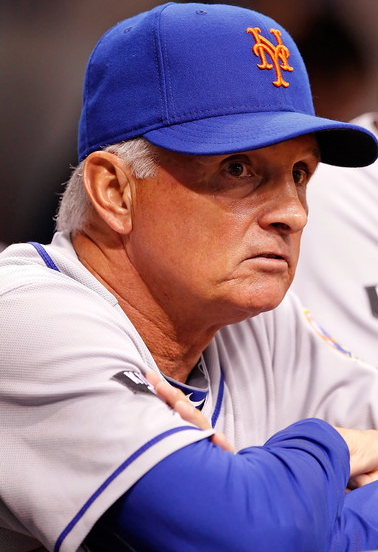Contract extensions will be all the buzz this offseason for the Mets.
The team’s only superstars, David Wright and R.A. Dickey, both are coming up on option years, so all the talk has been centered on them agreeing to contract extensions before making any other moves.
But there’s another potential extension that may be discussed this offseason: an extension for manager Terry Collins.
Collins signed a two-year contract in November, 2010 with a third-year option for 2013. Sure enough, even before the 2011 season was through, the Mets exercised Collins’s 2013 option.
Through two seasons in Flushing, Collins has a record of 151-173 with two mediocre-at-best teams. The team finished in fourth place in the NL East both seasons.
At least last year, the Mets had a little bit of firepower with Jose Reyes and a half-season of Carlos Beltran. This year, it was really a team of unproven players other than David Wright.
Maybe Collins’s two seasons didn’t end up so favorably, but there were times during each season that he had the Mets overachieving and playing great baseball. That’s really all you can ask from a manager on a cash-strapped team: getting the most out of his young talent.
Sometimes, the manager takes the blame for all of a team’s problems. Look at Bobby Valentine this year for the Red Sox. Granted, he didn’t always say the right things, but he wasn’t the one on the field underperforming.
But for the Mets, Collins so far has been considered more part of the solution than the problem. Many of the younger players gained a familiarity with him before he became manager, since he was the team’s minor league field coordinator in 2010.
The Mets should consider a multi-year contract extension for Collins, with reasons being two-fold.
First, Collins has earned this extension. Keeping a team of the Mets’ caliber in contention for as long as he did each season is certainly an accomplishment and should be rewarded with a vote of confidence.
Second, managers always seem to perform better when they are not on the hot seat. Rather than worrying about if his job is safe, Collins can focus on putting the 2013 Mets in the best position to win ballgames.
In all likelihood, 2013 will not be the second coming of 1986. But Collins has done enough in his time here to be a part of the next Mets’ playoff run, assuming that is sometime in the next five years when the team may actually have a bit more money to spend.
















